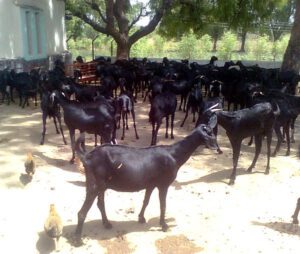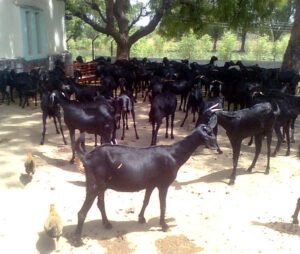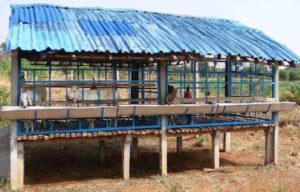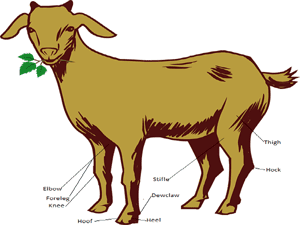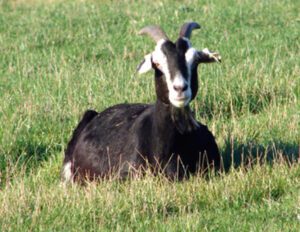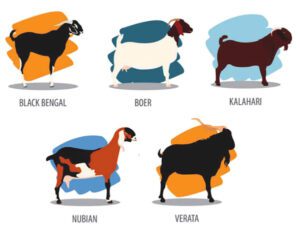Goat farming FAQ (frequently asked questions) are those questions which are asked frequently by the existing and beginner goat farmers. You should learn about the goat farming FAQ for running a goat farm successfully.
Goat farming is not a new business idea, and people are raising goats for food and as an additional income source for a very long time. And today, popularity of goat farming business is gaining popularity faster because it is a very profitable business.
Costs are relatively less for raising goats. And you will need to take less care of your goats as they are smaller sized animals.
Total world population is increasing gradually and demand for foods is also increasing. As a result, commercial goat farming business can be a very good way for earning additional income.
Goat Farming FAQs (frequently asked questions about goat farming)
There are many frequently asked questions about goat farming business. Here we are trying to discuss more about the goat farming FAQ. You will be able to run your goat farm successfully after reading these questions and answers.
1: What is Goat Farming Business?
Goat farming means ‘raising goats for the purpose of producing foods, fiber, manure etc’. Depending on the area, goats are raised for many different purposes such as meat, milk, fiber, skin, manure etc.
The main advantages of goat farming in farms is due to the fact that goats consume the sub-quality grazing matter (which is undesirable for other livestock animals and goats convert such feeds efficiently into good quality lean meat and nutritious milk). Goat farming business also require comparatively less investment.
2: Why Goat Farming?
Goat farming is very profitable, and you can take it as your main income source. Unemployed educated young people can take goat farming as an employment source. Even the women and children of a family can take goat farming as an additional income source. Commercial goat farming business can be a great source of income.
3: How to Start Goat Farming Business?
This is probably the mostly asked questions about goat farming business. Follow the steps mentioned below for starting and operating a successful goat farm.
- First of all, select a good location for your goat farm. It will be better if you can select an area which is far from the town or residential area.
- Have a piece of land ready for producing green feeds for your goats. Once again ‘choosing the location far from town or residential area will save you a lot of money’.
- Build a good house with all facilities available, after selecting the land.
- Purchase all the required equipment before bringing your goats home.
- Try to have practical knowledge or training from any govt. or private sources. Because practical farming knowledge or training is very important for running a goat farm successfully.
- Determine your production purpose. You can raise goats for many different types of goat products such as milk, meat, skin, fiber etc.
- And after determining your production purpose, choose quality breeds for your production type. For example, choose Boer, Beetal, Sirohi, Black Bengal, Nubian or Osmanabadi for meat production purpose. Choosing Jamunapari, Alpine, Saanen, Toggenburg etc. will be very good for milk production. Angora and cashmere goats are good for fiber production. And all types of goat breeds are good for skin production. And you can plan for skin production as a byproduct of your main production (either meat, milk or fiber).
- If possible, try to make a pasture for your goats. Because pasture is very important for the goats.
- Always try to feed your goats with very good quality goat feeds. Never provide them rotted or contaminated feeds.
- Supply fresh and clean water as per the demand of your goats.
- Breed your does with care, and take extra care of your breeding bucks and does.
- Always try to keep good contact with a vet in your area.
- Try to analyze the demand of goat products in your area and produce those things which has good demand in the local market.
- Keep record of total income and cost. Because record keeping is very important for raising goats.
4: How Much Land do I Need?
This totally depends on your production type and purpose. If you want to raise your goats in free range or pasture system, then you will be able to raise about 6-8 goats per acre of fertile land. But if the land is not fertile enough then 2-4 goats will be good per acre.
But if you are willing to raise your goats in stall fed system, then 1 acre land will be sufficient enough for raising 80-100 goats. In stall fed goat farming system, you have to keep your goats confined in a place, and use the land for producing food for them.

5: What Type of House do Goats Need?
Goats don’t require elaborate housing system with high-end facilities. They will be just fine if you can arrange the basic facilities for them. Just ensure that the house is dry and have adequate ventilation system. The house should be able to protect your goats from adverse weather, especially during winter and rainy season. Making the house in south-facing direction will be good. Keep separate pen inside the house for breeding bucks, pregnant does and also for the nursing does.
It will be better if you can make house raised from the ground. Although clay or concrete floor are also good for raising goats. 6-8 feet height of the house should be enough for most of the goat breeds. Ensure enough space is available inside the house. 8-12 square feet space per goat will be enough, although exact amount depends on the size of the goat breed. Ensure proper cleaning and sanitation facilities, and also disinfection and good ventilation facilities.
6: How to Raise Goats in the Backyard?
Raising goats in the backyard is also possible. But you should consider your surroundings while raising goats in the backyard, and you should not disturb your neighbors. Follow the aspects mentioned below for raising goats in the backyard.
- Check your local rules and laws before deciding to raise goats on your backyard. Try to learn whether goat farming is allowed in your area or not.
- Determine how many goats you are willing to raise in your backyard.
- Raising goats in the backyard is much more complicated and require extra care and responsibility to keep the animals healthy, happy and productive.
- Choose the right breed for raising in your backyard depending upon the available resources and breeding practices.
- Ensure enough space in your backyard so that your goats can move freely and graze.
- Make a good shelter in the backyard for your goats. Make the house properly so that your goats remain protected from rain, heat and cold.
- Along with grazing, always try to provide your goats with enough fresh and clean water and feeds.
- If you are willing to raise dairy goat breeds, then ensure availability of a milking stand with a stanchion.
- Goats are great escape artists. So good fencing is required for keeping them confined. Good fencing also helps to protect your goats from predators.
7: What to Feed the Goats?
This is among the mostly asked goat farming FAQ that most of the goat farmers ask. Actually feed for the goats depends on how they are being raised. The goats will require hay if they are not allowed to forage freely. Hay is considered the main part of a goat’s diet if it is not allowed to forage. Other common things as goat’s feed include fruits, weeds, grains, dried fruit, chaffhaye, vegetables, kitchen scraps etc. Baking soda, beet pulp, black oil sunflower seeds, loose minerals, apple cider vinegar, kelp meal etc.
Goats require grain for proper growth. Grains provide the goats with additional protein, vitamins and minerals. Grains can be given to the goats in many different ways and there are actually different types of grains available as a feed for the goats. Whole or unprocessed, pelleted, rolled and textured grains are generally given to the goats.
8: How Much Feeds Do Goats Require Daily
Exact amount of feeds depends on the size and age of the goats. But on an average, a goat will require 3-4 percent of feed of their total body weight.
9: How Long Can Goats Survive Without Food?
It has been observed that goats can survive without food for around 3 weeks and without water for 3 days. Although, you should not keep your goats without food and water for long time. Fed and water them often.
10: How Much Grain Per Goat?
Too much grain is not good for the goats, and you should provide your goats with grain in moderate amount. On average, a mature goat should not be provided more than one and a half pounds of grain daily. And the kids generally require even less amount of grains per day (approximately half cup daily). Remember ‘too much grain can kill the goats’.
11: What is the Feeding Schedule of Goats?
It will be better if you can allow your goats to roam freely, especially the dairy goats. Provide the milking goats with concentrated feeds during the milking time. And provide concentrate feed once a day for all other goats. The baby goats should have feeds 2-5 times depending on their age. 3-4 days old kids should have feeds 5 times a day. Feed the 3 days to 3 weeks old kids 3 to 5 times a day. And feed the 3 weeks to 6 weeks old kids twice a day.
12: How Much Money Do I have to Spend for Feeding Goats?
Answering the exact amount of this question is not possible. Exact amount depend on many different factors and can vary from place to place.

13: What Plants are Toxic to Goats?
All the plants available in a pasture are not good for goat’s health. Some of the plants are toxic to goats. And there are some plants which could be poisonous for goats and eating them could be dangerous for the goats. Azalea, kale, oleander, potato, poppy, rhubarb and rhododendron are some common cultivated toxic plants for goats. Ponderosa pine, plum, elderberry, cherry and yew trees are toxic to goats. And some weeds such as water hemlock, poison hemlock, spurge, poke weed, foxglove, lantana, locoweed, buttercup, bracken fern and milkweed are toxic to goats.
14: How Many Goat Breeds Available?
There are hundreds of different goat breeds available throughout the world. Some of these breeds are good for milk production, some are good for meat and some goat breeds are good for fiber production. You can choose any breed depending on your production purpose and availability of the breed in your area.
15: Which Goat Breeds are Good for Meat Production?
Boer, Black Bengal, Sirohi, Kiko etc. are very good for meat production purpose.
16: Which Breeds are Good for Milk Production?
Nubian, Saanen, Toggenburg, Jamunapari, Beetal etc. are good for milk production.
17: Which Goat Breeds are Good for Fiber Production?
Angora and Cashmere goats are considered very good for fiber production.
18: How Many Goats Do I Need to Start?
The number depends on your budget. Initially you should start with 10-20 goats and expand the number gradually.
19: How Much it Will Cost to Raise a Goat?
Once again, ‘it is very tough to tell the exact amount’. Exact among can vary from place to place and depends on many different factors.
20: How Much Water Required Per Goat Daily?
Total amount of water required per goat actually depends on the age and size of the goat. On average, a mature goat will need about 4-5 liters of water daily. Lactating does generally drink more water than normal bucks and does. Ensure availability of sufficient amount of fresh and clean water for all time.
21: How Can You Know if a Goat is Dehydrated?
Dehydration is a serious health problem occurring in goats (which is quite fatal). The symptoms of dehydration in goats can be found out by noticing it’s physical attributes like skin, weight, eyes, nose, gums, urination and through blood test.
22: Do I Have to Milk the Goat Daily?
This is also a common goat farming FAQ for the people who are planning to raise dairy goats for milk. Milk production of a doe is at it’s peak 2 months after kidding. And during this period, the does can be milked twice a day (after every 12 hours). So, basically you have to milk your does daily. And you should not stop milking your does suddenly. Instead, you should gradually decrease milking.
23: How Much Milk Can a Doe Produce Daily?
Exact among of milk depends on the dairy goat breed you are raising. For example, a lactating Saanen doe can produce about 3.8 liters and a Nigerian Dwarf doe can produce about 1.12 liters of milk daily. However, total milk production largely depends on the type of the goat breed.
24: How Much Does a Goat Cost?
Exact cost of a goat can vary from place to place, and also depend on the breed. You can expect the price between $50 and $500, and sometimes even more. Please search your local livestock market to learn the latest price.
25: What Diseases Can You Catch From Goats
Diseases that can be transferred from goats to human beings are Cryptosporidia, contagious echthyma, E coli, Leptospirosis, Q fever, psittacosis, ring worms and salmonellosis.
27: What are the Common Diseases of Goats?
Goats are susceptible to many diseases. Some common problems or diseases for goats are acetonemia, anaemia, abortion, anorexia, arthiritis, anthrax, bloat, rinderpest, brucellosis, bronchitis, big-head, E coli, Cystitis, dysentery, heat stress, contagious echthyma, eye conditions, goat pox, indigestion, hoof trimming etc.
28: What Causes Bloat in Goats?
Digestive fermentation in the rumen causes gas (which expelled out as the goat belches). Bloat occurs when sometimes the gas is trapped in the rumen, and it becomes life threatening in goats. There are possibly different types of bloat in goats like the frothy bloat, dry bloat and choke. The first step for controlling bloat is to stop feeding the goat with water or food for about 12 hours and consult with a vet as soon as possible.
29: What Causes Listeria in Goats?
Listeria in goats is caused by the bacteria listeria monocytogenes that is present in water, plant litter, silage, soil and goat’s digestive track. The main reasons of this disease are sudden changes in the goat’s feed, dramatic changes in weather conditions, pregnancy or feeding silage.Administering a proper medicine every 6 hours for 3 to 5 days and every day for 7 days in addition can completely cure the goats of this disease.
30: When the Goats Should be Vaccinated?
Vaccinating goats timely during different stages of it’s growth can help to prevent different diseases. Review the vaccination schedule for goats on our website or follow the vaccinating schedule below.
- Anthrax- Once annually with starting at 6 month of age.
- Black Quarter- Once annually with starting at 6 month of age.
- C.P.P- Vaccinate the kids at 3 months of age, and other goats should be vaccinated once annually during January.
- Enterotoxaemia- Vaccinate the kids at 1 week for the first time and again at 4 months of age. Vaccinate the mature goats just before monsoon and a booster dose is required after 15 days.
- Foot & Mouth Disease- Vaccinate the kids at their 4 months of age or above. Vaccinate other goats twice a year, mostly during March and September.
- Haemorrhagic Septicaemia- Vaccinate the kids at their 6 months of age, and vaccinate other goats just before monsoon.
- Goat Pox- Vaccinate the kids at their 4 months of age, and vaccinate other goats once annually in December.
- P.R- Vaccinate the kids at their 3 months of age or above. And vaccinate other goats once in 3 years.
31: What Causes Coccidiosis in Goats?
Coccidiosis is a protozoan that causes diarrhea in young goats. Coccidiosis in one of such disease that can spread to human beings if proper sanitary measures are not followed. Diarrhea with or without mucous or blood, emaciation, weakness, dehydration, anorexia and ultimately death are the common symptoms of coccidiosis. Consult with a vet as soon as you can for getting rid of this problem.
32: What Causes Scours in Goats?
Scours in goats may occur in goats due to many reasons such as coccidiosis, changes in diet, stress and parasites. Provide the goats with clean and fresh drinking water and consult with a vet as soon as you can for preventing scours.
33: When the Goats Should be Wormed?
The goats should be wormed timely for keeping them free from this internal parasite. Goats, especially the young goats are susceptible to parasitic infections like tapeworms. So vaccinate the kids at their 8 weeks of age for the first time, and repeat every 4 to 8 weeks until the kid has grown to the age of one year. For the adult goats, normal frequency of de-worming is 4 go 6 times a year.
34: When to Disbud a Goat?
The method of removing the horns from a goat is called disbudding or dehorning. Horns of a goat acts as added defense equipment against various predators, provide cooling effect during summer and also help the goats access different parts of the body during and itch. But if the behavior of a goat become aggressive, then the horns can become dangerous for you. In such case, you will need to disbud or dehorn the goats.
You can actually disbud a goat’s horn by using some simple tools. The goats are generally disbuded when they are about 1 month old, by using a hot iron. But in most cases, disbudding should be done within 4 to 10 days age of the kid. The minimum time required to disbud a small kid is around 15 to 20 seconds with a low-watt iron. The tip of the tool should have a diameter of 3/4 inch to 1 inch for perfect disbudding.
35: How Often do Goats Breed a Year?
This totally depends on the breed of goat you are raising. Generally the period between one heat cycle to the next is often referred to as the estrous cycle in goats and this occurs in does every 18 to 24 days.
36: What is the Age of Doe for Reproduction?
Female goats or does generally reach maturity withing their 4 to 12 months of age. A doe become ready for breeding when it reaches a body weight of 60 % to 70 % of the average adult goat weight.
37: What is the Breeding Season for Goats?
In most goat breeds, there are no exact breeding season and they can be bred at any time of the year.
38: How Long is a Goat’s Gestation Period?
The average gestation period of a doe vary from 145 to 155 days.
39: How long is a Goat’s Lactation Period?
Total length of a goat’s lactation period can vary from breed to breed. But on an average, the lactation period is about 284 days.
40: How Many Kids do Does Produce at Once?
This also depends on the breed of goat you are raising. For example, Black Bengal does can produce 2-3 kids per kidding and the Sirohi does generally produce only 1 kid per kidding.
41: How to Milk a Goat?
Milking a goat is very easy. You can easily milk your goats if you do this for several days. Review this guide for milking a goat.
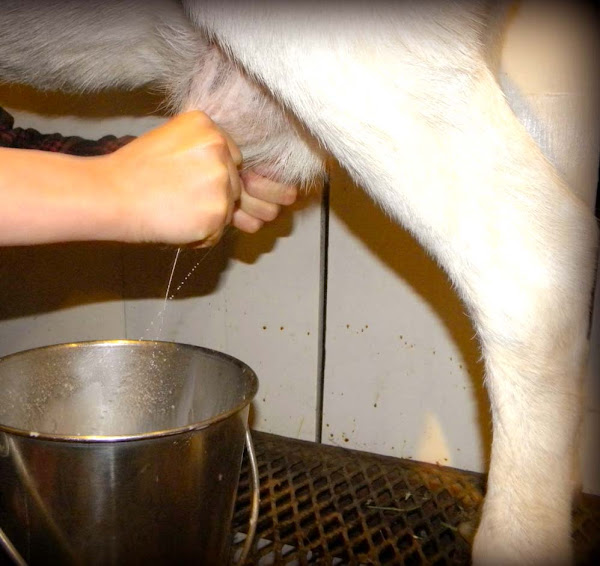
42: When to Wean a Kid?
Generally you can wean a goat kid when it reaches it’s 6 to 8 weeks of age. Read more about when to wean a goat kid.
43: What to Feed the Kids When Weaning?
Feeding the kids with high quality hay and some grains will be very good.
44: How and Where to Market Goat Products?
First of all, you have to target your local market for marketing your products. After that you can target local restaurants or any other nearby markets. Determine your marketing strategies first before starting goat farming business.
45: What are the Advantages of Goat Farming Business?
Goat farming business has some advantages. Some notable advantages of goat farming business are listed below.
- Goat farming business require less space.
- Many goat breeds available.
- Goats are raised for many different purposes.
- Goats are smaller sized animals and they require comparatively less feeds.
- Caring for goats is very easy.
- Goats can adapt themselves to many climates.
- Goats are hardy animals and they grow relatively faster.
- Caring costs for the goats are comparatively less.
- You can easily market the goat products.
- Goat farming business has great return on investment ratio.
- Risks in goat farming business are comparatively less.
- Goat farming can play a very important role for creating employment opportunities and eradicating poverty.
46: What are the Disadvantages of Goat Farming Business?
Along with the advantages mentioned above, goat farming business has some disadvantages or problems also. Some notable problems or disadvantages of goat farming business are mentioned below.
- Farmers are following traditional systems for raising goats.
- Lack of practical knowledge.
- Most of the beginning farmers can’t choose the right breed.
- Starting without prior experience.
- Lack of capital.
- Lack of adequate vet services.
- Lack of specially designed vehicles.
- Marketing difficulties.
- Predator problem.
- Risk of robbery.
- Disease attack.
- Irregular vaccination.
- Lack of proper care of the pregnant doe.
- Feeding problems.
- Sanitary management problem.
- Mixing or crossing of breeds.
- Risk of crop loss etc.
47: What is a male goat called?
A male goat is called a buck.
48: What is a female goat called?
A female goat is called a doe.
49: What is a baby goat called?
A baby goat is called a kid.
These are the common goat farming FAQs. Hope you have learned a lot about the common questions about goat farming. God bless you!

